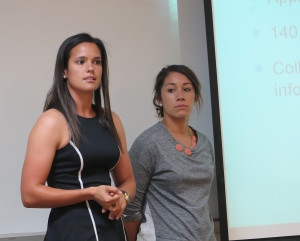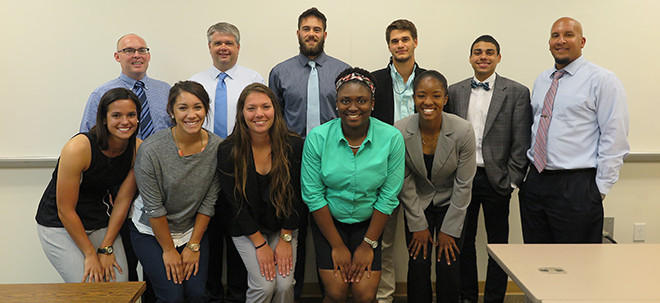When Jacksonville played host for the second and third rounds of the NCAA Men’s Basketball Tournament in March, the gain to the city wasn’t just pride and prestige. It was financial as well.
Jacksonville University students, faculty, staff and administrators helped prepare for and execute the nationally recognized sporting event at Veterans Memorial Arena, which has come to the city three times since 2006.
Partnering with SMG, the arena’s event management company, and the City of Jacksonville, JU Sport Business students not only volunteered at the tournament, but completed a research study to measure the economic impact on the city hosting the event. The City of Jacksonville’s department of Sports and Entertainment has the specific goal to “attract, host and create opportunities that positively influence economic impact and improve the quality of life and cultural engagement for residents, visitors and businesses.”

JU students provided insight into the economic impact the event had on the City of Jacksonville.
“This was a great opportunity for our students to take their interdisciplinary studies of sport business and economics in order to provide real insights on the true impact of a highly publicized sporting event,” said Dr. Todd Hall, Assistant Professor of Sport Business and faculty advisory for this project. “The research conducted provided the City of Jacksonville with valuable information for future events.”
The total economic impact was calculated based on those who visited Jacksonville just for the event, including competing teams, media and fans of the competing teams. Those who were local residents were not included in the study based on the assumption that the money spent for the event would have been used for alternative entertainment options.
With a conservative estimate, and assistance of an economic impact multiplier of 1.73 provided by Dr. Hassan Pordeli, Hugh Culverhouse Chair and Professor of Economics at JU, the overall economic impact was found to be slightly more than $10.6 million. This is the approximate amount of additional revenue brought to the city for the three-day sporting event.
The economic impact study also accounted for the costs of hosting the event. One unique aspect of hosting the NCAA March Madness Basketball Tournament is that there are virtually no costs involved for the host city. The NCAA reimburses each Local Organizing Committee for the expenses incurred. Therefore, the students found that the economic impact on the City of Jacksonville was substantial.
“Being able to contribute to the Jacksonville business community is very important to JU and the Davis College of Business,” said Dr. Don Capener, Dean of the DCOB. “The Sport Business program has embraced engagement and analytics while making a huge impact on this national event.”
 Wave Magazine Online Jacksonville University News Hub
Wave Magazine Online Jacksonville University News Hub
